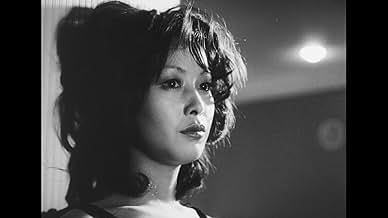PUNTUACIÓN EN IMDb
6,2/10
1,1 mil
TU PUNTUACIÓN
Añade un argumento en tu idiomaA revolutionary faction steals some hand bombs. While escaping, several soldiers are killed. The movement's highest authority deems October unfit and sends the leader of another faction to t... Leer todoA revolutionary faction steals some hand bombs. While escaping, several soldiers are killed. The movement's highest authority deems October unfit and sends the leader of another faction to take the remaining bombs.A revolutionary faction steals some hand bombs. While escaping, several soldiers are killed. The movement's highest authority deems October unfit and sends the leader of another faction to take the remaining bombs.
Reseñas destacadas
Koji Wakamatsu's "Ecstacy Of The Angels" runs for a mere eighty-nine minutes. After it ended it felt more like eight nine hours. Wakamatsu, known as the "Pink Godfather" (no, don't ask me why), was a pioneer of the pinku eiga genre. I had never heard the name Wakamatsu before. According to the blurb in the festival guide, "Ecstacy of The Angels" is a parable about a revolutionary organization torn apart by betrayal, its members descending into paranoia, sadism and sexual decadence. It sounded like a plot from an early Godard film, only from a Japanese perspective. This sounded interesting, I thought. It was about as interesting as having a tooth extracted. The opening sequence, in black and white, is set in a nightclub. A female singer screeches absurd lyrics, while at a nearby table three men and a woman sit in silence. Pretty soon though, I couldn't figure out which revolutionary faction was which, and by that time I was beyond caring. The actors don't just speak their lines, the bellow them at each other, as if they were all auditory challenged. In the frequent sex scenes (which are about as erotic as two storefront mannequins coupling), they go through the motions of sexual congress while mouthing absurd platitudes about fighting for the revolutionary cause. Frankly, Wakamatsu is definitely no match for Godard. Which reminds me, I need to visit my dentist for a check up. It'll be less painful all round.
This movie is unique in 2 aspects:
1) It is the only Japanese movie I have ever seen that is incredibly awful,
2) It is a movie with abundant nudity and sex that is unbelievably boring!
The "plot" concerns revolutionaries in Japan in the 60-70s, and their dedication, or lack of, to some unspecified political movement, frequently interrupted with sex. Expect long, pretentious monologues on dedication to the movement, relieved only by unemotional, mechanical sex. One very violent scene of a struggle between 2 factions for stolen bombs, and some random, senseless bombings in ?Tokyo round out the action.
Really, spend your 90 minutes elsewhere.
1) It is the only Japanese movie I have ever seen that is incredibly awful,
2) It is a movie with abundant nudity and sex that is unbelievably boring!
The "plot" concerns revolutionaries in Japan in the 60-70s, and their dedication, or lack of, to some unspecified political movement, frequently interrupted with sex. Expect long, pretentious monologues on dedication to the movement, relieved only by unemotional, mechanical sex. One very violent scene of a struggle between 2 factions for stolen bombs, and some random, senseless bombings in ?Tokyo round out the action.
Really, spend your 90 minutes elsewhere.
I found I liked this a little less than I did when first seen on video a few years ago. Perhaps it just shows what effect 9/11 and subsequent worldwide terrorist activities have had on our psyche. This remains a well put together, exciting and amusing tale of confused young fighters (for they know not what) on the streets of Tokyo late 60's. The pace and style of Wakamatsu's film making is infectious but the pain of events and concerns for safety have made it much more difficult to be sympathetic to lost youth taking it out on innocent people. It's a shame because this, almost Godard like, movie so full of vitality, could inspire many to take up the making of movies but instead one is now frightened that the vulnerable might be encouraged in their cowardliness to take out others for a bit of glory. A sad reflection of the times we find ourselves in. Good film though!
Koji Wakamatsu's treatment of this story is, compared to big budget filming, what guerilla warfare is to a full blown World War. Imagine seeing a hysterical comedy about idealistic terrorists betrayed by their leaders as written by Jean-Luc Godard, produced by David Lynch and directed by Gregg Araki: that gets you somewhere in the neighbourhood of what this picture is like. Untroubled by storytelling conventions Wakamatsu lets the thin thread that holds all scenes more or less together snap halfway through the film. His scenes of bloodcurdling violence are thrown at you with the gusto of a rabid modern painter. Visually brilliant and wonderfully over the top with some poignantly funny touches, this ranks as one of the most enthralling political nightmares ever printed on celluloid.
The film is a dated, incoherent, and pretentious rambling about fictional revolutionary, or rather quasi-revolutionary, terrorist group(s) in Tokyo in the sixties. Although there may be some resemblance to early Godard, Wakamatsu seems to be much less accomplished thinker, revolutionary, or craftsman than the French master of the New Wave. Notwithstanding the typically Asian overacting, all the persons in the "plot" act as detached mechanical puppets (perhaps intentionally?). They are not good in making either revolution or love. The frequent sex scenes were quite irritating not only because the participants recited quasi-political slogans, but also due to sometimes awkward choreography or cuts necessitated by the bizarre Japanese censorship law that does not allow a glimpse of pubic hair on the screen.
I wonder if the sign "WEAPON WEARHOUSE" on a weapon warehouse in the film is a joke for insiders or rather a testimony on the level of production values in this movie.
I wonder if the sign "WEAPON WEARHOUSE" on a weapon warehouse in the film is a joke for insiders or rather a testimony on the level of production values in this movie.
¿Sabías que...?
- CuriosidadesThis film was released in a time of violent social turmoil for Japan. ATG, the film's distributor, got cold feet when a rash of Christmas tree bombing, similar to the one in the movie, started to plague the streets of Tokyo. The film was quickly withdrawn from distribution and briefly re-released in the art theater circuit.
- PifiasWhile the revolutionaries enter the base, a sign reading "weapon wearhouse" instead of "weapon warehouse" is clearly visible for several seconds.
- ConexionesEdited into Gli ultimi giorni dell'umanità (2022)
Selecciones populares
Inicia sesión para calificar y añadir a tu lista para recibir recomendaciones personalizadas
- How long is Ecstasy of the Angels?Con tecnología de Alexa
Detalles
Taquilla
- Recaudación en todo el mundo
- 585 US$
- Duración1 hora 29 minutos
- Color
- Mezcla de sonido
- Relación de aspecto
- 2.35 : 1
Contribuir a esta página
Sugerir un cambio o añadir el contenido que falta

Principal laguna de datos
By what name was Tenshi no kôkotsu (1972) officially released in Canada in English?
Responde

















